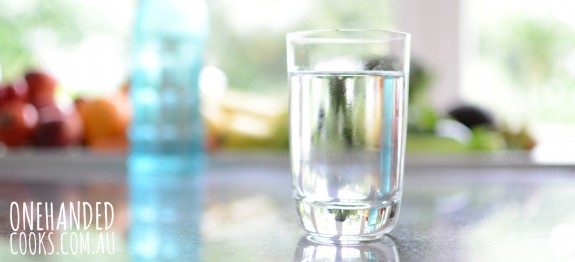Keeping Our Babies and Toddlers Hydrated
It’s only a few weeks into Spring and some days we’re already reaching 30 degrees in Sydney. We’re all packing the winter clothes away, pulling out the dresses, shorts and t-shirts and craving more salads. We’re probably finding ourselves looking for the water bottle too, wanting to drink more throughout the day. And our babies and toddlers are probably feeling the same.
Water is an essential component of all forms of life, so keeping our babies and toddlers adequately hydrated is important for their general health and well-being.
Our fluid intake comes mostly from the food and fluid we consume as well as a small amount from metabolic processes that occur in the body.
Our fluid output comes from water losses via the urine, faeces, sweat and other insensible losses such as water evaporating through the skin and moisture losses via breathing.
Keeping these in balance ensures we stay happily hydrated.
How much fluid do our babies & toddlers need?
Nutrient Reference Values (NRVs) for water have been set by the National Health and Medical Research Council (NH& MRC) as Adequate Intakes.
Infants:
| Age | Adequate Intake (AI) |
| 0-6 months | 700ml/day (from breast milk and formula) |
| 7-12 months | 800ml/day (from breast milk, formula, food, cooled water and other beverages) |
Toddlers & Young Children:
| Age | Adequate Intake (AI) | |
| Total Fluid (food & fluid) |
Fluids (plain water, milk, and other drinks) |
|
| 1-3 years | 1.4 L/day | 1.0 L/day |
| 4-8 years | 1.6 L/day | 1.2 L/day |
So, what about in hot, humid climates or weather?
Breast milk is an amazing fluid, ever-changing to suit your baby. In healthy infants, exclusively breastfed babies don’t require supplemental water. During hot humid weather their water requirements can be met via breastmilk, however they may want to breastfeed more frequently and it may be for shorter periods. This allows them to receive more of the fore-milk which is perfectly suited for quenching their thirst. If you are breastfeeding it is important you maintain your own hydration by drinking water regularly, to ensure you can respond to the increase in demand for milk.
Older children living in hot humid climates (especially very active kids) may require higher than these amounts to keep hydrated.
What should they drink?
- Breast milk & formula. Exclusively breast fed infants do not require additional fluids up to 6 months of age.
- Tap* water. For infants over the age of 6 months or those who are not exclusively breastfed, tap water is the preferred drink. This should be boiled and cooled for infants until 12 months of age and offered in a cup (including sippy cups).
- Cow’s milk. Cow’s milk can be offered after 12 months of age, in volumes recommended up to 600 ml per day. Any more than this can affect adequate nutrient intake, iron absorption and appetite.
Note: Babies and toddlers don’t need fruit juice for many reasons. Tea, herbal teas, coffee and other beverages aren’t recommended as they have no known benefit and could possibly be harmful.
*Tap water is a good source of fluoride, important for strong teeth and bones.
The Australian Dietary Guidelines and Infant Feeding Guidelines provide more detail on appropriate fluids for babies and toddlers.
Can they drink too much water?
Babies and toddlers have a small stomach so too much water or fluids may fill their small bellies, reducing their appetite for other nutritious foods.
What are the signs and symptoms of dehydration?
Children are often at greater risk of dehydration due to their body composition. In addition to this, children are dependent on caregivers to provide and offer fluids regularly. It also important for parents and carers to recognise the difference between when their child may be hungry compared to when they are thirsty.
The Australian Breastfeeding Association (ABA) has some simple tips to help notice signs of dehydration in your young children:
- Fewer wet nappies
- Concentrated or dark-coloured urine that smells of ammonia
- Unhappy and irritable
- Hot and dry to the touch.
Medical assessment is recommended for infants who don’t feed well, are lethargic or appear confused, have a dry mouth and skin, dull sunken eyes and a sunken fontelle.
Diarrhoeal illnesses are the most common cause of dehydration, especially in children. Appropriate medical diagnosis and treatment is essential in these cases and oral rehydration solutions may be of benefit.
Yum!
Some yummy recipes from One Handed Cooks to help your children keep cool and hydrated this summer:
- Superfood Banana-Lemon Fro-Yo
- Watermelon Icy Poles
- Rainbow Fruit Skewers
- Tropical Fruit Baby Puree
- Blueberry Yoghurt
- Banana Mango Smoothie
Don’t forget to read our disclaimer. If you have any specific questions or concerns regarding the nutritional adequacy of your child’s diet or their health and wellbeing please consult a medical practitioner or an Accredited Practising Dietitian (APD) for individualised advice.
Join us on Facebook for other foodie bits and pieces.



























